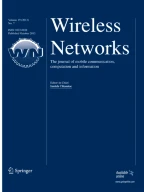Abstract
Vehicular networking has a promising potential as a communication medium to relay the information related with the road safety, traffic efficiency and infotainment and thus many researches are conducted in this area. This research presents a study of multi-channel allocation in orthogonal frequency multiple access vehicular ad hoc network (VANET) under physical channel model. The performance of channel allocation using the altered number of channels allocated per vehicle is observed. An optimization method for channel allocation is also presented. The optimization method is based on meta-heuristic approach namely bacterial foraging optimization algorithm (DBFO). The sets of channels allocated to vehicles are represented by the position of bacterium. To improve the performance of channel allocation, the signal to interference and noise ratio (SINR) of vehicles is used as the objective function of DBFO. Hence, DBFO is utilized to find the appropriate channels for vehicles so that the SINR and the throughput of vehicles can be increased. The performances of multi-channel allocation in VANET and the proposed optimization method are observed through the extensive simulations. The results of the simulations show that increasing the number of channels allocated per vehicle can decrease the SINR average since the interference level increases. Meanwhile the vehicle throughput increases since the more channels allocated to vehicles means the more bandwidth utilized.
Similar content being viewed by others
Explore related subjects
Discover the latest articles, news and stories from top researchers in related subjects.References
Hartenstein, H., & Laberteaux, K. P. (2008). A tutorial survey on vehicular ad hoc networks. IEEE Communications Magazine, 46(6), 164–171.
Karagiannis, G., Altintas, O., Ekici, E., Heijenk, G., Jarupan, B., Lin, K., et al. (2011). Vehicular networking: A survey and tutorial on requirements. Architectures, Challenges, Standards and Solutions, IEEE Communications Surveys and Tutorials, 13(4), 584–616.
Cheng, N., Lu, N., Liu, K., Wang, X., & Liu, F. (2010). A prioritized resource scheduling scheme for throughput-sensitive applications in VANET. In 2010 6th International conference on wireless communications networking and mobile computing (WiCOM) (pp. 1–4).
Tomar, R. S., & Verma, S. (2010). RSU centric channel allocation in vehicular ad-hoc networks. In 2010 Sixth international conference on wireless communication and sensor networks (pp. 1–6).
Fazio, P., De Rango, F., Sottile, C., Calafate, C., & De Valencia, U. P. (2011). A new channel assignment scheme for interference-aware routing in vehicular networks. In 2011 IEEE 73rd vehicular technology conference (VTC Spring) (pp. 1–5).
Wang, J., Ji, Y., Wang, X., & Liu, F. (2012). RSU-coordinated multi-channel MAC with multi-criteria channel allocation. In 2012 International conference on connected vehicles and expo (ICCVE) (pp. 60–65).
Saritha, V., & Viswanatham, V. M. (2014). Approach for channel reservation and allocation to improve quality of service in vehicular communications. IET Networks, 3(2), 150–159.
Saritha, V., & Krishna, P. V. (2016). Learning automata-based channel reservation scheme to enhance QoS in vehicular adhoc networks. In 2016 IEEE global communications conference (GLOBECOM) (pp. 1–6).
Li, M., Zhao, L., Member, S., & Liang, H. (2017). An SMDP-based prioritized channel allocation scheme in cognitive enabled vehicular ad hoc networks. IEEE Transactions on Vehicular Technology, 66(9), 7925–7933.
Yao, Y., Zhang, K., & Zhou, X. (2017). A flexible multi-channel coordination MAC protocol for vehicular ad hoc networks. IEEE Communications Letters, 21(6), 1305–1308.
Tabassum, M., Razzaque, A., Hassan, M. M., & Almogren, A. (2016). Interference-aware high-throughput channel allocation mechanism for CR-VANETs. EURASIP Journal on Wireless Communications and Networking, 216(2), 1–15.
Gu, J. (2017). Dynamic spectrum allocation algorithm for resolving channel conflict in cognitive vehicular networks. In 7th International conference on electronics information and emergency communication (ICEIEC) (Vol. 2017, No. 14, pp. 413–416).
Zhou, K., Gong, C., Wu, N., & Xu, Z. (2017). Distributed channel allocation and rate control for hybrid FSO/RF vehicular ad hoc networks. Journal of Optical Communications and Networking, 9(8), 669–681.
Kuang, Z., Chen, Z., Pan, J., & Sajjadi, D. (2017). Joint optimization of spectrum access and power allocation in uplink OFDMA CR-VANETs. Wireless Networks. https://doi.org/10.1007/s11276-017-1537-7.
3GPP TS 36.211. (2011). Physical channels and modulation (Release 10) (pp. 1–184). Available at http://www.etsi.org/deliver/etsi_ts/136200_136299/136211/10.00.00_60/ts_136211v100000p.pdf.
Amjad, M., Rehmani, M. H., & Mao, S. (2018). Wireless multimedia cognitive radio networks: A comprehensive survey. IEEE Communications Surveys and Tutorials, 20(2), 1–49.
Yaacoub, E., Dawy, Z., & Member, S. (2012). A survey on uplink resource allocation in OFDMA wireless networks. IEEE Communications Surveys and Tutorials, 14(2), 322–337.
Passino, K. M. (2002). Biomimicry of bacterial foraging for distributed optimization and control. IEEE Control Systems Magazine, 22(3), 52–67.
Stanica, R., Chaput, E., & Beylot, A. (2011). Simulation of vehicular ad-hoc networks: Challenges, review of tools and recommendations. Computer Networks, 55(14), 3179–3188.
Oyama, S. (2009). Activities on ITS radio communications standards in ITU-R and in Japan. 1st ETSI TC-ITS Workshop, February (pp. 1–22).
Mecklenbräuker, C. F., Karedal, J., Paier, A., Zemen, T., & Czink, N. (2011). Vehicular channel characterization and its implications for wireless system design and performance. Proceedings of the IEEE, 99(7), 1189–1212.
Fernández, H., Rubio, L., Rodrigo-Peñarrocha, V. M., & Reig, J. (2014). Path loss characterization for vehicular communications at 700 MHz and 5.9 GHz under LOS and NLOS conditions. IEEE Antennas and Wireless Propagation Letters, 13, 931–934.
Author information
Authors and Affiliations
Corresponding author
Rights and permissions
About this article
Cite this article
Sulistyo, S., Alam, S. Performance study and optimization of multi-channel allocation in VANET under physical channel model. Wireless Netw 25, 4785–4797 (2019). https://doi.org/10.1007/s11276-018-1770-8
Published:
Issue Date:
DOI: https://doi.org/10.1007/s11276-018-1770-8
